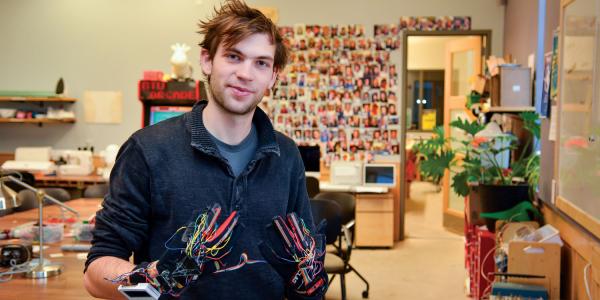Computing Power
Women represent more than half of all new U.S. college graduates but receive fewer than 20 percent of computer and information science degrees. Former Bell Labs executive Lucy Sanders (MCompSci’78), leader of the CU Boulder-based National Center for Women & Information Technology (NCWIT), is trying to fix that.
There’s huge demand in our economy for workers with computing skills and growing interest among students. Why aren’t there more women in computing?
Several interrelated theories exist. First, society has associated computing with something men do — it has been gendered male. This means society harbors an unconscious bias about ‘who does tech,’ and it influences what we do: Who we encourage, who we hire, who we give
visible technical jobs to, who we promote.
Second, the popular media has portrayed technologists in less than flattering roles — remember the computing geek in Jurassic Park?
Finally, some argue the advent of the home PC led parents to encourage their sons more than their daughters not only to learn more about how to use a computer, but to explore how it works.
You served as R&D vice president and chief technology officer at Bell Labs. How’d you get into computing, and did you ever find yourself thinking, ‘Where are all the other women?’
My father ran a corporate computing data center and my older sister got an early computing B.S. degree. So it was part of our family conversation. I also had a high school math teacher who taught us how to program BASIC and FORTRAN — she encouraged curiosity in us.
Working at Bell Labs was an honor. Although women and other minority groups never achieved representative parity, we were pretty darn close and much better than what many organizations achieve today.
What’s NCWIT’s general strategy for drawing women into computing and helping them succeed?
NCWIT unites nearly 900 organizations across the computing ecosystem to significantly increase girls’ and women’s meaningful participation. NCWIT serves as a ‘personal trainer,’ providing advice, resources, tool kits and plug-and-play programs to help them achieve their diversity and inclusion goals. Both women and men are involved as leaders, essential to achieving lasting outcomes.
How is CU Boulder doing?
CU Boulder has been a long-time and active member of NCWIT. The College of Engineering and the computer science department track and analyze metrics, consider different approaches to recruiting, develop new curricular approaches and encourage student persistence. They also have amazing outreach efforts that help build the computing/engineering K-12 pipelines. Recently the College of Arts and Sciences introduced a new B.A. program that allows even more students to enroll in computing-related disciplines. CU understands this is a long-distance race.
What should industry be doing differently?
The cultures at many companies, large and small, have been justifiably criticized over the last few years. Often, members of historically marginalized groups are finding unwelcome, if not hostile, cultures and find it hard to contribute their ideas. It’s critical that technical products and services are created by diverse engineers — if many types of people are involved, we will solve problems differently and we will solve different problems.
It’s really not that hard to understand — homogenous cultures lead to group-think. Corporations need to look at diversity and inclusion as integral to their business practices, not as something optional.
Are any industries or prominent companies notably better at recruiting, retaining and promoting women in computing than others?
Some are starting to make progress and we are encouraged, but there is still a distance to go. We advocate public transparency and publication of technical diversity data as a first step.
What do young women interested in computing ask you most often?
I get a lot of questions about my early technical work. It’s pretty amazing that a high school student today cares about the history of the C programming language or the UNIX operating system. They want to know everything about ‘how it was then’ at Bell Labs. It’s a lot of fun to be around them. One of our students was funded by Mark Cuban on Shark Tank, others started a tech company that won a best of show award at SXSW. They are amazing.
Condensed and edited by Eric Gershon.
Photo by Christopher Carruth







